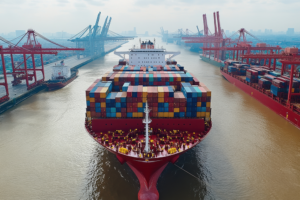On April 2, 2025, President Donald Trump announced a series of tariffs targeting imports from multiple countries, with rates ranging from 10% to 50%. This move has sent shockwaves through global supply chains, compelling businesses to reassess and adapt their operations.
Immediate Impact on Import Costs
The immediate effect of these tariffs is an increase in the cost of imported goods. Companies that rely heavily on foreign suppliers are now facing higher expenses, which may lead to increased prices for consumers. This scenario forces businesses to explore alternative strategies, such as diversifying their supplier base or relocating production facilities to countries not affected by the tariffs.
Disruptions in Customs and Logistics
Furthermore, the uncertainty surrounding these tariffs has led to delays in customs clearance, as companies hesitate to process shipments without a clear understanding of the financial implications. This bottleneck disrupts the timely delivery of goods, affecting inventory levels and customer satisfaction.

Technological Investments for Enhanced Visibility
In response, businesses are investing in advanced supply chain technologies to gain better visibility and control over their operations. By leveraging data analytics and real-time tracking, companies can make informed decisions to mitigate the impact of these tariffs.
Broader Economic Implications
Economists warn that the tariffs could reignite inflation, raise the risk of a U.S. recession, and boost costs for the average U.S. family by thousands of dollars. The financial markets have also responded negatively, with significant drops in major indices. The Dow Jones Industrial Average, for instance, experienced a decline of nearly 1,600 points, reflecting investor concerns over the potential for a global economic slowdown.
Conclusion
President Trump’s tariffs have introduced significant challenges to global supply chains. To navigate this new landscape, businesses must adopt flexible strategies, invest in technology, and remain vigilant to ongoing policy changes. By proactively addressing these challenges, companies can better position themselves to maintain operational efficiency and customer satisfaction in an increasingly complex trade environment.
At Grydd we harness the power of AI to transform your logistics operations. From predictive analytics to real-time tracking and process automation. Grydd offers cutting-edge solutions to help you stay ahead in an increasingly digital and connected world.
Discover what Grydd can do to revolutionize your logistics
and boost your Supply Chain Management
and boost your Supply Chain Management









